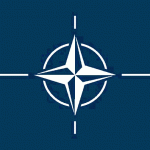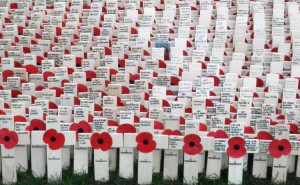11th November 2012 Yerevan, Armenia
NATO Week and Remembrance Day: planning for the future, and remembering the past
This wee k we have been celebrating NATO Week in Armenia – an annual opportunity for both NATO member states and the Armenian government to present to a wider public what we have been doing together and why both sides value the partnership.
k we have been celebrating NATO Week in Armenia – an annual opportunity for both NATO member states and the Armenian government to present to a wider public what we have been doing together and why both sides value the partnership.
As the NATO Contact Point Embassy, I and our defence liaison team – Lt-Col Steve Phillips, our Defense Attache, and Sergey Mirzoyan, our Defence Relations officer – were keen to support the busy programme of events organised by the MFA. Highlights for me included:
- A seminar in Yerevan on ‘the added value’ of NATO partnership which brought together speakers and participants from a really diverse range of countries, including Poland, Georgia, Germany, Australia, Slovakia, France, Latvia, Ukraine, Russia, Belgium, Ukraine, Italy, Romania, the US, Belarus and Turkey. James Appathurai, NATO’s Special Representative for the Caucasus, also attended and did some TV and media interviews.
- A TV bridge with some of the 126 Armenian peacekeeping troops currently serving in Afghanistan under German command. I was particularly glad to be there with the soldiers’ families – parents, wives and children – and to be able to thank the soldiers for their important contribution in a difficult place and the families too for the sacrifices they are making. Armenia is the only CSTO country which is part of the mission in Afghanistan and this commitment is really valued by all NATO member states.
- A visit to the Peacekeeping Brigade HQ in Yerevan, where I saw at first hand some of the training – and brilliant English-language skills – of this elite part of the Armenian army. I particularly enjoyed the demonstration of how to deal with an uncooperative driver at a checkpoint and an angry mob brandishing bottles.
- The hugely impressive, first class technology of the Crisis Management Centre of the Ministry of Emergency Situations, and their commitment to employing skilled staff with disabilities in their new Centre, due to open shortly.
I also enjoyed my trip to Gyumri with John Heffern (US Ambassador), Steve Phillips (our Defence Attache), Bill Lahue (NATO Liaison Officer from Tbilisi) and Ambassador Mkrchyan (from the MFA), to give a presentation at Gyumri University about NATO. This event underlined a couple of points which for me are at the core of the messages we wanted to get out this week:
- Firstly, talking about NATO partnership in a city which hosts one of the biggest Russian military bases in the region symbolises the open, non-exclusive nature of NATO partnership policy.
Every country on the NATO periphery has its own particular needs and interests. NATO has tried to respond to that by offering options – not laying down demands. NATO partnership is driven by the fundamental belief that democracy and regional stability can only be enhanced by the development of modern, professional, well-trained, well-motivated military forces under civilian control and budgetary scrutiny, who regularly take part in international exercises and operations.
- Second, I was really keen to give a presentation with my Defence Attache to foreground what often gets forgotten when the man on the street thinks about NATO: that civilian/military partnership is at the heart of what NATO is.
Men and women in civilian clothes and uniform walk around the (very long and confusing) corridors of NATO HQ and eat at the same canteen. And the expertise of both is brought to the table in discussing options and making decisions.
As one speaker said this week – it is naive and simplistic to say that civilian control over the military means that the military should undertake whatever command is given to them, no matter how stupid. Rather, a mature, transparent and democratic relationship of mutual respect between civilian and military should mean that a political decision-maker would be well-informed and realistic and would never take such an ill-advised course of action against military advice.
So – it’s been a really well-organised and thought-provoking week. But there’s another reason why I’ve been thinking about our armed forces all this week. November 11 is Remembrance Day in the UK – the day we remember the sacrifice made by brave servicemen and women, those injured in the line of duty, and the families they leave behind.
Ever since the end of World War I (brought to an end by a ceasefire at 11am on the eleventh day of the eleventh month in 1918), we have marked this day.
 And we support the charity which looks after the welfare of ex-Servicemen and their families, the Royal British Legion, by buying a poppy – the flower which bloomed across some of the worst battlefields of Flanders in World War I (£40m was raised last year).
And we support the charity which looks after the welfare of ex-Servicemen and their families, the Royal British Legion, by buying a poppy – the flower which bloomed across some of the worst battlefields of Flanders in World War I (£40m was raised last year).
This simple red flower is a symbol both of the blood spilled in the war, and of new life even amid devastation – a mark of respect for the sacrifice of so many, and a reminder that all our efforts should be directed to avoiding the carnage of war again.
This is also a good message to underline in NATO week.